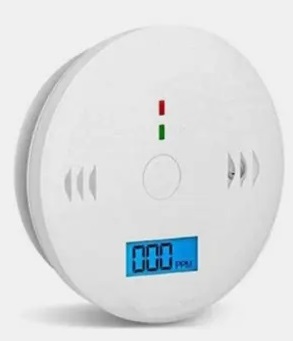
3.17.23 – Consumer Reports
The devices failed to send an alert in the agency’s tests
The Consumer Product Safety Commission (CPSC) is warning consumers not to buy or use two carbon monoxide detectors it says can fail to alert them to the presence of the potentially deadly gas.
The models are the GLBSUNION and CUZMAK digital display carbon monoxide (CO) detectors, both of which are sold on Amazon, according to the CPSC warning. Accidental CO poisoning causes more than 200 deaths in the U.S. every year, the CPSC says.
The agency is urging consumers not to purchase or sell these detectors. They should stop using them, dispose of them immediately, and replace them with new detectors. Consumers can report any product-related injuries to the CPSC at SaferProducts.gov.
The GLBSUNION and CUZMAK detectors are round and made of white plastic, with a digital display and a diameter of about 4 inches. The specific models cited are Model No. AJ-938 (sold under the Amazon ASIN B093Y1KK5Q and B093Y637CM) and Model No. CD01 (sold under the Amazon ASIN B07MPVK6HG and B07K44HLCV). They were $16 to $40 on Amazon.
Both were said to alert occupants with a flashing red LED and a loud alarm if dangerous levels of CO were present. But carbon monoxide sensitivity tests performed on the detectors by the CPSC found that they failed to issue alerts when exposed to a high (400 ppm) concentration of carbon dioxide, a violation of UL 2034, a voluntary safety standard.
CR hasn’t tested the exact detectors involved in this warning. But in 2017 we tested three seemingly identical products, two of which failed to alarm. The third alarmed too quickly, raising the possibility of nuisance alarms, a danger in itself. Those models, which were sold on eBay and Amazon, received a “Don’t Buy, Safety Risk” designation from CR.
Bernie Deitrick, a Consumer Reports senior test engineer, said that while he couldn’t say whether those models were the same as the ones flagged by the CPSC, “these are identically configured to models we tested in 2017 and were judged ‘Do Not Buy.’ ” He recommended that consumers purchase detectors only from recognized brands or brands that CR tests. “Don’t buy based on a lower price,” Deitrick said. “If you don’t recognize the brand, don’t buy it.”
CR tests CO detectors for their response to both high (400 parts per million) and low (100 ppm) levels of carbon monoxide, as well as the accuracy of the CO levels they display on their screens or through voice alerts. The results are published in our ratings.
“This is a serious warning,” said Oriene Shin, CR’s policy counsel for product safety. Shin noted that while she was glad to see the CPSC get the word out to the public, the lack of a recall was concerning. “There’s a lot we don’t know. Where are the manufacturers in all this? How are they going to get these faulty products out of homes and make consumers whole? And if they won’t do it, who will?”
“People should be able to trust that a product they buy won’t hurt them—especially when it’s advertised as something that will keep them safe, and they’re shopping at a well-known outlet,” Shin continued. “It’s critical for both manufacturers and sellers to verify that products meet minimum standards and can be recalled quickly and effectively if there’s a safety hazard. Otherwise, it’s going to be very hard for people to trust listings on Amazon and other major online marketplaces and know they’re not putting themselves, or their families, at risk.”
In July 2021 the CPSC filed an administrative complaint against Amazon, charging that the online retailer should be responsible for recalling products sold on its website that are defective or present a risk of serious injury or death to consumers. The complaint cited 24,000 CO detectors that failed to alarm, among other products. CR supported the action.
A month later, Amazon announced a new process by which it would pay consumers for claims under $1,000 connected to defective products that caused property damage or personal injury.
An Amazon spokesperson said the detectors in question had been removed from the site and that it had notified customers and issued refunds. “Safety is a top priority at Amazon and we require all products offered in our store to comply with applicable laws and regulations,” the spokesperson wrote in an email. “We have proactive measures in place to prevent prohibited products from being listed and we continuously monitor our store and remove any such products and take corrective actions when we find them.”
Below, we list several CO detectors that excelled in CR’s tests. You can also check our carbon monoxide detector ratings to see other models we’ve tested and our smoke and carbon monoxide detector buying guide to help you determine how to keep your home safe. The CPSC recommends that you install CO detectors on each level of your home and outside sleeping areas, and that you only buy detectors that meet the UL 2034 safety standard. Additionally, CR recommends that detectors be tested weekly and replaced every five years.
